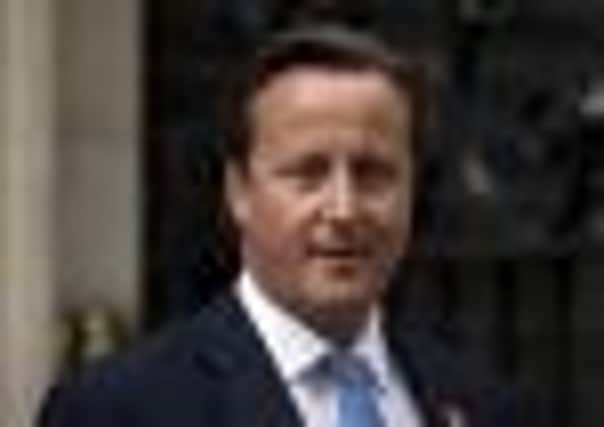Ewan Crawford: Principles, not personalities, need to change


This week the big political news which will electrify Westminster is that some politicians, who few people have ever heard of, are about to be swapped for another bunch who are even less well-known.
Reshuffle fever may be gripping the corridors of power in Whitehall, but there can be few occasions which illustrate the gulf between government and governed than the merry-go-round of ministerial appointments.
Advertisement
Hide AdAdvertisement
Hide Ad“I’ve been wondering: is Grant Shapps ready for promotion and I’m really worried about what’s going to happen to David Willetts,” is not a conversation likely to have been repeated by most people over the past few days.
The Prime Minister, however, is expected to refresh the Cabinet this week and so these vital questions will soon be resolved.
This reshuffle is all about showing that David Cameron is getting back to business after the summer break and pursuing with renewed vigour his vision of what he called this week “the hard road to success”.
In reality, of course, there is a need to be seen to be doing something in the face of growing external and internal criticism which has culminated in a senior Tory back-bencher challenging the Prime Minister to show whether he is a man or a mouse.
In the past, when there were real ideological differences within Labour and the Conservatives, re-shuffles could mean something in terms of signalling a new political direction.
In his fascinating diaries of life in Downing Street during the troubled Labour administration of the 1970s, the former head of the Number Ten policy unit, Bernard Donoughue, reveals the balancing act that first Harold Wilson and then Jim Callaghan had to wrestle with in terms of the left-right divide.
When he first took office and wanted to reshuffle the government, Mr Callaghan told Mr Donoughue he “needed some good left-wingers”.
When Mr Callaghan was defeated by Margaret Thatcher in 1979, her appointments were scrutinised carefully for an indication of how confident she felt in shifting away from the old Tory one-nation tradition.
Advertisement
Hide AdAdvertisement
Hide AdSubsequent reshuffles demonstrated her growing strength as she replaced “wets” with “dries” more to her ideological liking.
During the premiership of Tony Blair, reshuffles were mainly an opportunity for stories about the power relations between Mr Blair and his chancellor, Gordon Brown.
Reading the memoirs of New Labour figures, it seems that poor Nick Brown, ex-chief whip and agriculture minister, was something of a proxy in this game as his fortunes symbolised whether his more powerful Scottish namesake was in the ascendency or not.
Mr Blair did at times try to use reshuffles to reshape policy, advancing the careers of those he viewed as modernisers (in other words, sympathetic to private involvement in the provision of public services).
But it is interesting that he confided to his closest advisers that he hated reshuffles which he called a horrible experience.
There can be few prime ministers or political leaders who actively enjoy the process of telling reluctant colleagues that they have to move from a job they enjoy, or worse, are to be sacked from the front-bench altogether.
Even working in the SNP leader’s office in opposition when the stakes were not that high (the decision over who was to be shadow transport minister in 2002 probably won’t go down as a key moment in the cause of Scottish independence), I remember reshuffle days as easily among the worst of times.
One of the remarkable things about the current SNP government since it was first elected in 2007 has been the relative stability of the Cabinet.
Advertisement
Hide AdAdvertisement
Hide AdThe voters didn’t exactly punish the SNP at the subsequent election for not ringing the changes. In fact the competence of ministers was clearly a key reason for the party’s spectacular success last year.
The contrast with the way the SNP is still seen by many voters in Scotland (judging by its impressive opinion poll lead) and the coalition government in Westminster is one clue as to why Mr Cameron and Mr Clegg are shifting the deckchairs this week.
There is no great ideological battle to win or reconcile. There is absolutely no sign that either party leader is willing to change course on the substance of economic policy that has driven the country back into recession.
Indeed, all the internal political pressure is coming from those who want to press on with even more right-wing ideology.
One man who seems certain to make a come-back is the Liberal Democrat David Laws, who previously lasted just 17 days in office before resigning over his expenses claims. During his time in the political wilderness, Mr Laws has been calling for even bigger cuts than the ones currently being proposed. The state, he says, is too large.
This, then, is the prospect that awaits us here in Scotland. A new team of Conservative-Liberal Democratic ministers determined to cut spending even further because of an ideological agenda that sees the state as a burden rather than a help.
Those cuts will mean further pressure on jobs and will mean greater disadvantage for the vulnerable in particular who depend on public services.
When the changes are announced, because of devolution, we in Scotland can breathe a sigh of relief that whoever is Education or Health Secretary can have only a limited impact on policy here.
Advertisement
Hide AdAdvertisement
Hide AdBut the overall spending decisions that do affect us will indeed be determined by a government whose values are alien to most Scottish voters.
It is then not the personalities that need to be changed; it is the powers that require re-shuffling – a process that will transfer them from Westminster to Scotland.